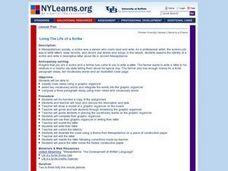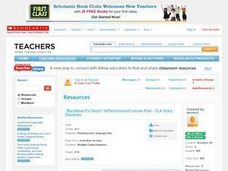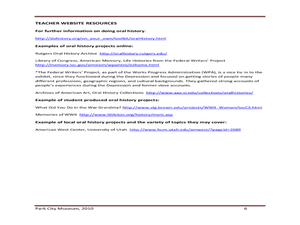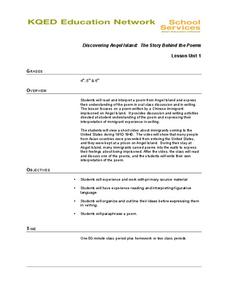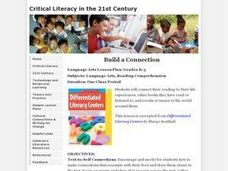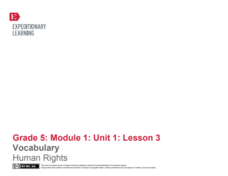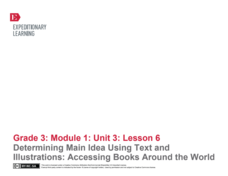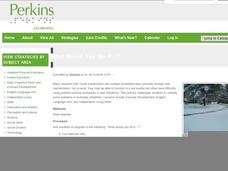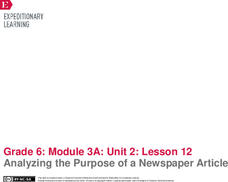Curated OER
Understanding Cause and Effect
Identify the author's organizational pattern for expressing ideas. After reading an article on the California Gold Rush, middle schoolers determine the author's purpose for writing a passage of informational text. A full list of...
Curated OER
Living The Life of a Scribe
Students write a descriptive letter about life in ancient Mesopotamia. Through video streaming, students discover the history of Mesopotamia. They assume the role of a scribe and compose a three paragraph essay using main ideas and...
Curated OER
Kumeyaay Indians
Useful for literary analysis, citing textual evidence, or summary skills, this instructional activity about the Kumeyaay Indians would be a good addition to your language arts class. Middle schoolers read novels and summarize the...
Curated OER
Characterization in Literature
Students discover characterization techniques and methods. For this characterization lesson, students choose favorite fiction characters and discuss what makes a character come alive. Students then describe a family member or a friend...
Curated OER
"Blackbeard's Ghost" Differentiated Lesson Plan
Develop a better understanding of "Blackbeard's Ghost" with this differentiated lesson. Working in groups on a creative project, middle schoolers can reinforce their reading comprehension and literary analysis skills. Use this lesson to...
Curated OER
Persuasive Writing - Anticipating Opposing Views
Persuasion, when used effectively, is a powerful and effective tool. In groups, young writers develop a persuasive letter about something that they would like their parents to allow them to do. Then, independently, they use proper...
Curated OER
Oral History: Park City Museum
Bring U.S. history to your language arts class with this activity. Middle schoolers complete an interview for an oral history project, and discuss the importance of oral histories - and how they embellish written accounts. They write...
Curated OER
Retelling Stella Louella's Runaway Book: Point of View
Stella Louella’s Runaway Book launches a study of point of view and storytelling. After reading the tale, class members retell the story from the point of view of another character. The scripted plan, developed by a teacher candidate,...
Curated OER
Discovering Angel Island: The Story Behind the Poems
Poems carved into the wooden walls of the Asian immigrant prisons on Angel Island provide upper elementary graders an opportunity to study not only the story behind the poems but to also focus on the figurative language employed by the...
Benjamin Franklin Tercentenary
Benjamin Franklin and Learning a Lesson
Examine stories with a moral in a character development instructional activity. The class reads a short story written by Benjamin Franklin in which he pays too much for a toy whistle. Individuals then make text-to-self connections and...
Curated OER
Build a Connection
Learners discuss their personal connections with stories they've read in the past and identify techniques to connect with more stories. They create illustrations, construct task cards, and complete sentence stems based on books they read...
Curated OER
Summary and "The Fallacy of Success"
Suggested to accompany a class reading of The Great Gatsby, this plan begins with a discussion emphasizing the reputation of Vanderbilt University. Then, after the class has a working knowledge of the wealth associated with the school,...
One Hen
Making Choices
When choosing what foods to eat, there are a lot of factors to consider. To help make the decision a little easier, young learners work in small groups developing short plays, stories, or advertisements that address the different issues...
EngageNY
Vocabulary: Human Rights
Your class continues to explore the history of the Universal Declaration of Human Rights. In addition to learning about the background of this text, learners work on the skill of identifying and understanding key academic vocabulary....
Core Task Project
Whatif by Shel Silverstein
What a skillful way to incorporate Shel Silverstein, a wonderful author, into the classroom. Composed of three tasks, children are led through a series of text-dependent questions that force them to unveil the meaning of Silverstein's...
Curated OER
Barnyard Protest: Cows, Chickens & Fundamental Freedoms
Here is an ambitious and engaging activity that should help elementary schoolers begin to develop a basic understanding of human rights. Pupils are asked to think about their own rights, the rights of others, and how an individual's...
EngageNY
Taking Notes Using a Graphic Organizer: Inferring About the Importance of Religion in Colonial America
Improve class understanding of colonial times by reading an informational text and filling out the accompanying graphic organizer. Class members work with a partner to read, take notes, make inferences, and synthesize information.The...
EngageNY
Determining Main Idea Using Text and Illustrations: Accessing Books Around the World
Ease into informational text with the lesson suggested here. Part of a unit series, the lesson draws from previous lessons and acts as a natural moment to add in informational text. Class members read one section of My Librarian is a...
EngageNY
Close Reading of Excerpts from My Librarian Is a Camel: How Do People Access Books Around the World?
Acquaint your class with informational text through a close reading. First, examine a couple of pages together, looking at text features and content. The whole class focuses on marking down a brief summary of each paragraph before...
Perkins School for the Blind
Silly or Sensible?
Is it silly or sensible? That's a great question, and it's the question that will drive this entire lesson. Learners with special needs and visual impairments work together to analyze verbal information. The instructor makes a statement,...
Perkins School for the Blind
What Would You Do If...?
What would you do if...? That's a great question, and, when posed to learners with visual impairments, a question that can foster concept development and speaking and problem-solving skills that relate to real-life situations. The...
Maryland Department of Education
The Concept of Diversity in World Literature Lesson 4: Proverbs
"Eneke the bird says since men have learnt to shoot without missing, he has learnt to fly without perching." As part of their study of Things Fall Apart, class members read Paul Hernadi and Francis Steen's essay, "The Tropical Landscapes...
EngageNY
Introducing Module 4B: “Water Is Life”
Learners take a gallery walk around the classroom to view various images and quotes. As they walk, they write down what they notice and wonder about what they see. After discussing their notice and wonder notes, they read the...
EngageNY
Analyzing the Purpose of a Newspaper Article
Shh! No talking during the discussion! Using the resource, scholars engage in a silent discussion called a Chalk Talk activity to analyze the purpose of a newspaper article. Additionally, they read a model newspaper article and try to...



